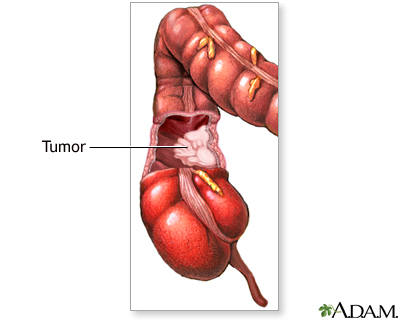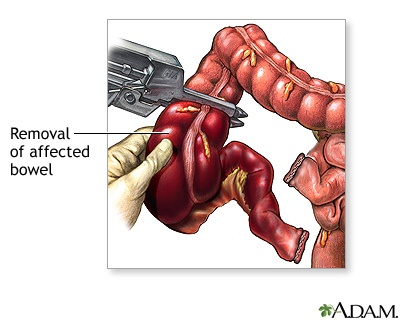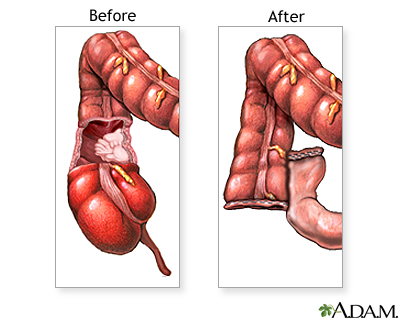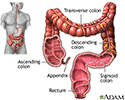Colorectal cancer
Colorectal cancer; Cancer - colon; Rectal cancer; Cancer - rectum; Adenocarcinoma - colon; Colon - adenocarcinoma; Colon carcinoma
Colorectal cancer is cancer that starts in the large intestine (colon) or the rectum (end of the colon).
Other types of cancer can affect the colon. These include lymphoma, carcinoid tumors, melanoma, and sarcomas. These are rare. In this article, colon cancer refers to colorectal cancer only.
Causes
In the United States, colorectal cancer is one of the leading causes of deaths due to cancer. Early diagnosis can often lead to a complete cure.
Almost all colon cancers start in the lining of the colon and rectum. When doctors talk about colorectal cancer, this is usually what they are talking about.
There is no single cause of colon cancer. Nearly all colon cancers begin as noncancerous (benign) polyps, which slowly develop into cancer.
You have a higher risk for colon cancer if you:
- Are older than 45
- Drink alcohol
- Smoke tobacco
- Are obese
- Are African American or of eastern European descent
- Eat a lot of red or processed meats
- Have colorectal polyps
- Have inflammatory bowel disease (Crohn disease or ulcerative colitis)
- Have a family history of colon cancer
Some inherited diseases also increase the risk of developing colon cancer. One of the most common is called Lynch syndrome.
What you eat may play a role in getting colon cancer. Colon cancer may be linked to a high-fat, low-fiber diet and to a high intake of red meat. Some studies have found that the risk does not drop if you switch to a high-fiber diet, so this link is not yet clear.
Symptoms
Many cases of colon cancer have no symptoms. If there are symptoms, the following may indicate colon cancer:
- Abdominal pain and tenderness in the lower abdomen
- Blood in the stool
- Diarrhea, constipation, or other change in bowel habits
- Narrow stools
- Weight loss with no known reason
Exams and Tests
Through screening tests, colon cancer can be detected before symptoms develop. This is when the cancer is most curable.
Your doctor will perform a physical exam and press on your belly area. The physical exam rarely shows any problems, although the doctor may feel a lump (mass) in the abdomen. A rectal exam may reveal a mass in people with rectal cancer, but not colon cancer.
Certain tests used to screen for colon cancer may suggest colon cancer. A sigmoidoscopy, or more likely, a colonoscopy, will be done to evaluate any normal results.
Only a full colonoscopy can see the entire colon. This is the best screening test for colon cancer.
Blood tests may be done for those diagnosed with colorectal cancer, including:
- Complete blood count (CBC) to check for anemia
- Liver function tests
If you are diagnosed with colorectal cancer, more tests will be done to see if the cancer has spread. This is called staging. CT or MRI scans of the abdomen, pelvic area, or chest may be used to stage the cancer. Sometimes, PET scans are also used.
Stages of colon cancer are:
- Stage 0: Very early cancer on the innermost layer of the intestine
- Stage I: Cancer is in the inner layers of the colon
- Stage II: Cancer has spread through the muscle wall of the colon
- Stage III: Cancer has spread to the lymph nodes
- Stage IV: Cancer has spread to other organs outside the colon
Blood tests to detect tumor markers, such as carcinoembryonic antigen (CEA) may help the doctor follow you during and after treatment.
Treatment
Treatment depends on many things, including the stage of the cancer. Treatments may include:
- Surgery to remove the tumor
- Chemotherapy to kill cancer cells
- Radiation therapy to destroy cancerous tissue
- Targeted therapy to keep cancer from growing and spreading
SURGERY
Stage 0 colon cancer may be treated by removing the tumor using colonoscopy. For stages I, II, and III cancer, more extensive surgery is needed to remove the part of the colon that is cancerous. This surgery is called colon resection (colectomy).
CHEMOTHERAPY
Most people with stage III colon cancer receive chemotherapy after surgery for 3 to 6 months. This is called adjuvant chemotherapy. Even though the tumor was removed, chemotherapy is given to treat any cancer cells that may remain.
Chemotherapy is also used to improve symptoms and prolong survival in people with stage IV colon cancer.
You may receive just one type of medicine or a combination of medicines.
RADIATION
Radiation therapy is sometimes used for colon cancer.
For people with stage IV disease that has spread to the liver, treatment directed at the liver can be used. This may include:
- Burning the cancer (ablation)
- Delivering chemotherapy or radiation directly into the liver
- Freezing the cancer (cryotherapy)
- Surgery
TARGETED THERAPY
- Targeted treatment zeroes in on specific targets (molecules) in cancer cells. These targets play a role in how cancer cells grow and survive. Using these targets, the drug disables the cancer cells so they cannot spread. Targeted therapy may be given as pills or may be injected into a vein.
- You may have targeted therapy along with surgery, chemotherapy, or radiation treatment.
Support Groups
You can ease the stress of illness by joining a colon cancer support group. Sharing with others who have common experiences and problems can help you not feel alone.
Outlook (Prognosis)
In many cases, colon cancer is treatable when caught early.
How well you do depends on the stage of the cancer and other factors. When treated at an early stage, many people survive at least 5 years after diagnosis. This is called the 5-year survival rate.
If the colon cancer does not come back (recur) within 5 years, it is considered cured. Stages I, II, and III cancers are possibly curable. In most cases, stage IV cancer is not thought to be curable, but there are exceptions.
Possible Complications
Complications may include:
- Blockage of the colon, causing bowel obstruction
- Cancer returning in the colon
- Cancer spreading to other organs or tissues (metastasis)
- Development of a second primary colorectal cancer
When to Contact a Medical Professional
Call your health care provider if you have:
- Black, tar-like stools
- Blood during a bowel movement
- Change in bowel habits
- Unexplained weight loss
Prevention
Colon cancer can almost always be caught by colonoscopy in early stages, when it is most curable. All adults age 45 and older should have a colon cancer screening. How often you should have screening depends upon the test being used.
Colon cancer screening can often find polyps before they become cancerous. Removing these polyps may prevent colon cancer.
People with certain risk factors for colon cancer may need earlier testing (before age 45) or more frequent testing.
A healthy lifestyle also may help reduce your risk for colon cancer:
- Get regular physical activity.
- Don't smoke or use tobacco.
- Maintain a healthy weight.
- Eat a diet rich in fruits and vegetables and low in red and processed meats.
References
National Cancer Institute website. Colorectal cancer prevention (PDQ) - health professional version. www.cancer.gov/types/colorectal/hp/colorectal-prevention-pdq. Updated April 21, 2022. Accessed April 28, 2022.
National Comprehensive Cancer Network website. NCCN clinical practice guidelines in oncology (NCCN Guidelines). Colorectal cancer screening. Version 1.2022 - March 4, 2022. https://www.nccn.org/professionals/physician_gls/pdf/colorectal_screening.pdf. Updated March 4, 2022. Accessed April 28, 2022.
Qaseem A, Crandall CJ, Mustafa RA, et al. Screening for colorectal cancer in asymptomatic average-risk adults: a guidance statement from the American College of Physicians. Ann Intern Med. 2019;171(9) :643-654. PMID: 31683290 pubmed.ncbi.nlm.nih.gov/31683290/.
Rex DK, Boland CR, Dominitz JA, et al. Colorectal cancer screening: recommendations for physicians and patients from the U.S. Multi-Society Task Force on Colorectal Cancer. Am J Gastroenterol. 2017;112(7):1016-1030. PMID: 28555630 pubmed.ncbi.nlm.nih.gov/28555630/.
US Preventive Services Task Force website. Final recommendation statement. Colorectal cancer: screening. www.uspreventiveservicestaskforce.org/uspstf/recommendation/colorectal-cancer-screening. Published May 18, 2021. Accessed April 28, 2022.
Colon cancer
Animation
Barium enema - illustration
Barium enema
illustration
Colonoscopy - illustration
Colonoscopy
illustration
Digestive system - illustration
Digestive system
illustration
Rectal cancer - X-ray - illustration
Rectal cancer - X-ray
illustration
Sigmoid colon cancer - X-ray - illustration
Sigmoid colon cancer - X-ray
illustration
Spleen metastasis - CT scan - illustration
Spleen metastasis - CT scan
illustration
Structure of the colon - illustration
Structure of the colon
illustration
Stages of cancer - illustration
Stages of cancer
illustration
Colon culture - illustration
Colon culture
illustration
Colon cancer - Series
Presentation
Colostomy - Series
Presentation
Large bowel resection - Series
Presentation
Large intestine (colon) - illustration
Large intestine (colon)
illustration
Barium enema - illustration
Barium enema
illustration
Colonoscopy - illustration
Colonoscopy
illustration
Digestive system - illustration
Digestive system
illustration
Rectal cancer - X-ray - illustration
Rectal cancer - X-ray
illustration
Sigmoid colon cancer - X-ray - illustration
Sigmoid colon cancer - X-ray
illustration
Spleen metastasis - CT scan - illustration
Spleen metastasis - CT scan
illustration
Structure of the colon - illustration
Structure of the colon
illustration
Stages of cancer - illustration
Stages of cancer
illustration
Colon culture - illustration
Colon culture
illustration
Colon cancer - Series
Presentation
Colostomy - Series
Presentation
Large bowel resection - Series
Presentation
Large intestine (colon) - illustration
Large intestine (colon)
illustration
Review Date: 1/25/2022
Reviewed By: Todd Gersten, MD, Hematology/Oncology, Florida Cancer Specialists & Research Institute, Wellington, FL. Review provided by VeriMed Healthcare Network. Also reviewed by David Zieve, MD, MHA, Medical Director, Brenda Conaway, Editorial Director, and the A.D.A.M. Editorial team.







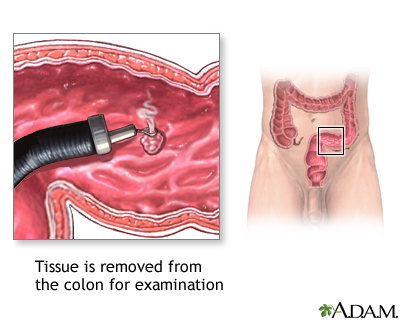










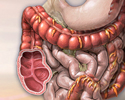









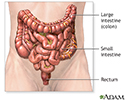



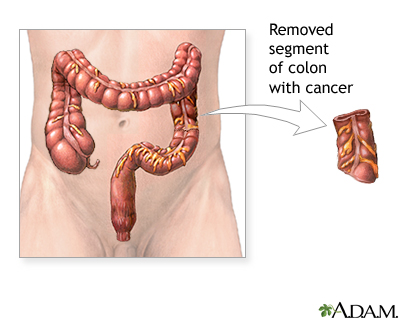

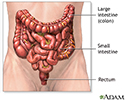

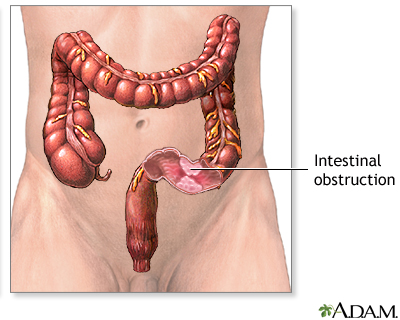
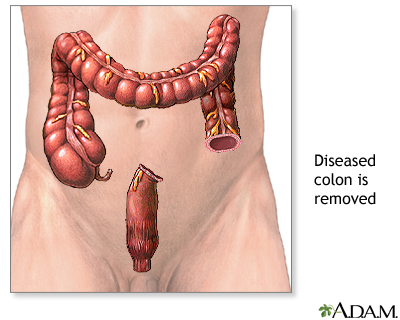
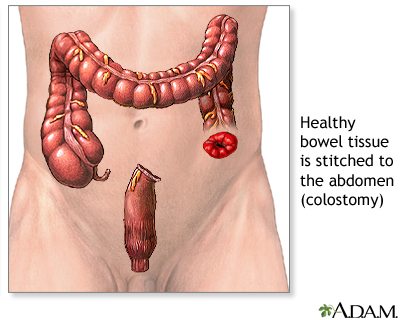
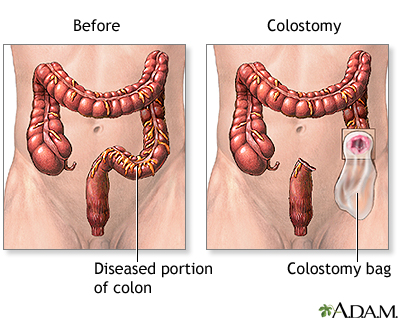
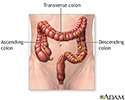
![<strong>Large bowel resection - Series</strong><p>The large bowel [large intestine or the colon] is part of the digestive system. It runs from the small intestine to the rectum. It is made up of three portions; the ascending, transverse and descending colon. The ascending colon is sometimes referred to as the right colon; the descending colon is sometimes referred to as the left, or sigmoid colon.</p>](/TransAdam/doc/graphics/images/en/10255.jpg)
